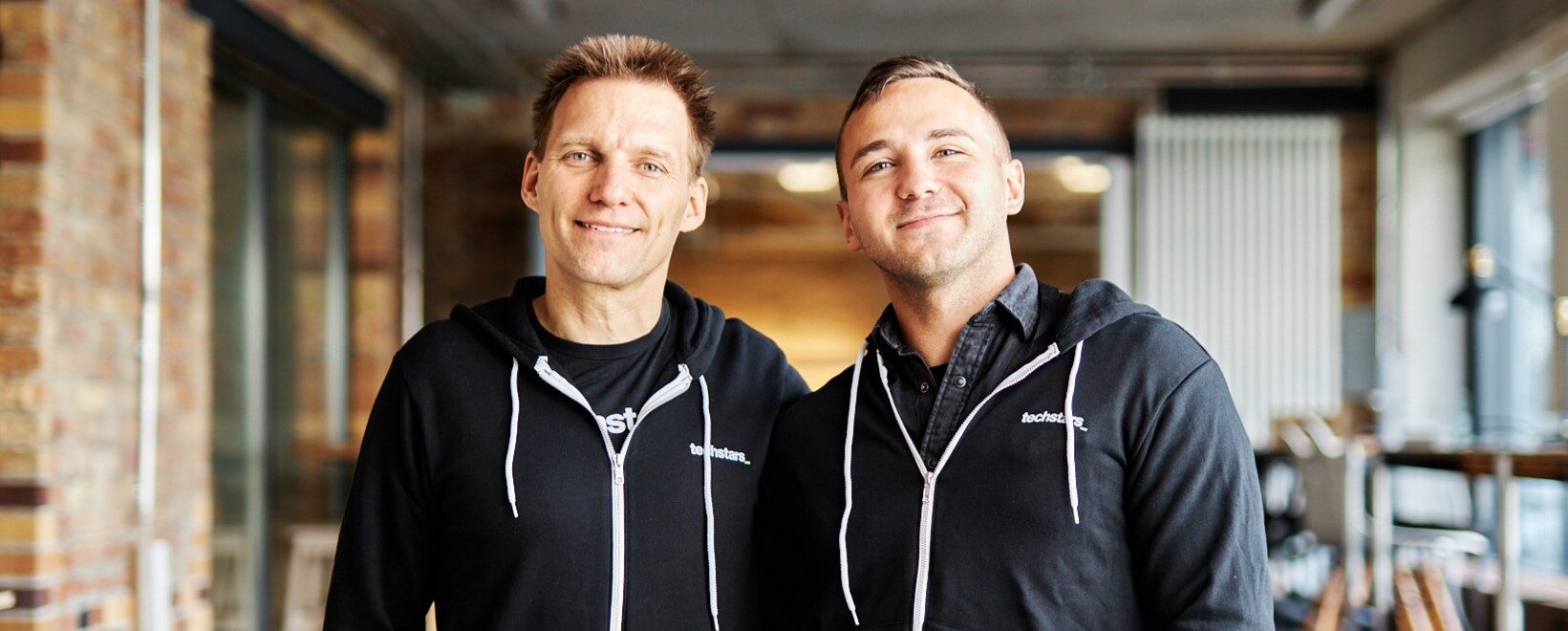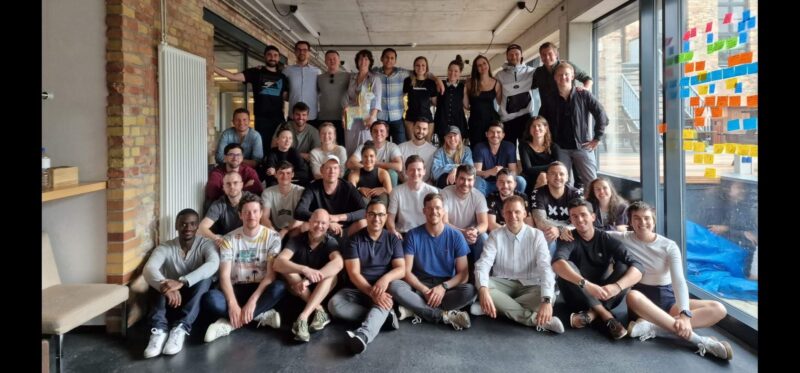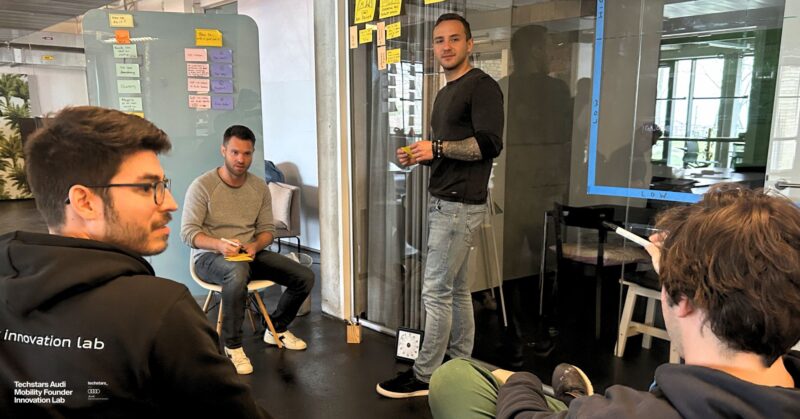Introduction to ARTIAL
Q: Can you introduce yourself and your startup briefly?
A: My name is Egor Folley, and my startup is called ARTIAL. We’re focused on AI-driven software for autonomous drone inspections. Originally, the idea was to build software to help drones be more intelligent, but after customer interviews, it was clear that we needed to make a pivot. The “core” idea is the same, but we switched the target customer to the enterprise section. Currently, 80 to 90 percent of drone operations require a pilot. So, we’re developing software enabling drones to fly autonomously, understand the surroundings, and fly safely. That’s why our software encompasses dynamic obstacle avoidance and visual estimation, enabling flight in hard-to-reach, confined, and GPS-denied areas.
Our goal is to improve inspections and enhance the quality of data collected, focusing on the construction, infrastructure, and energy sectors. Essentially, we’re working on autonomous systems technology to elevate the quality of inspections and digitalization. The objective of the company.
Why Techstars?
Q: Why did you decide to join the Techstars accelerator program?
A: We faced a financial crisis in February or March while building a startup. Our bank account had a mere $13, and it was clearly the end of the year-long journey. So, I applied to Techstars, a renowned accelerator program, and awaited a response. During this waiting period, we began networking, doing development work, and exploring financing options. Then, a Techstars associate contacted me, showing interest in my application and resume. Impressed by their swift approach, we had a 30-minute call the very next day. Several rounds of evaluations later, we received the acceptance we hoped for.
Techstars initially felt like an immense entity, especially since I was just 25, and this was my inaugural startup. Despite my confidence, I knew little about the startup world. But Techstars offered exceptional support. Firstly, they imparted the right entrepreneurial mindset and crucial insights. Secondly, as the largest pre-seed investor, they cultivated this mindset further, connecting us with the right individuals and mentoring us on the startup journey. During the three-month program, our perspective evolved considerably. Moreover, the support doesn’t end with the program; we maintain connections within the Techstars network, enabling us to engage with like-minded entrepreneurs. This generous and ongoing support transformed me from a novice into a confident founder who understands the startup landscape.
Q: Can you share your experience with the Techstars application process and the number of interview rounds?
A: The Techstars application process is straightforward. You begin by submitting your application through their website, which includes a few pages of questions about your startup, addressing problems, solutions, and your background. You can select up to three relevant programs. If Techstars is interested, they invite you for interviews.
In my case, I didn’t initially choose a specific program. Instead, someone referred us because it was a better fit for us as we moved from Barcelona to Germany. Originally, I had a co-founding team, but didn’t work out, and during the program, I had to lay them off.
The interview process typically involves several rounds. It starts with an interview with an associate, then moves to higher levels like the investment principal and managing director. Feedback is given after each round, which might include suggestions for application improvements.
For programs with partners like Audi, additional interviews may be required. Expect two to three rounds of interviews, with Techstars providing constructive feedback shortly after each interview to help you fine-tune your application.
Q: When it comes to evaluating startup traction, are there specific criteria or numbers that Techstars looks for?
A: Techstars primarily focuses on the potential of early-stage startups, taking a holistic approach beyond just numbers. While some traction is valuable, it varies based on your startup’s nature and how well you present your case. We had minimal traction but were accepted due to our passion. However, it’s important to note that they don’t base acceptance solely on traction; they consider the overall potential, the idea, and your commitment to making it a reality.
It also depends on each program’s focus and its MD (managing director). In our case, Martin had the potential and gave us a chance.
Q: Can you describe the time and effort required to complete the Techstars application process?
A: Surprisingly, the Techstars application process was quite swift for us, taking only two weeks. Within the first week, I had already gone through three interviews, which led to some introspective moments. I vividly remember a Friday night when Brian, the investment principal, urgently called me, giving positive feedback. He told me we were moving forward and provided me with two days to complete an external form, which is necessary for internal processes. Subsequently, we had a pitching committee, and it all progressed rather efficiently.
Daily Life During the Program
Q: What does the process look like once you’re accepted into the Techstars program, and how does the program take shape?
A: After being accepted into Techstars, there’s a clear roadmap ahead. By this point, you’ve already discussed the equity arrangement, the next steps, and the program’s requirements. In our case, one key requirement was relocating to the designated location. This phase involves handling various legal aspects and equity matters. You’ll need to prepare all the necessary information, whether you already have a company or not. The process also involves getting acquainted with the new environment and preparing for the transition.
Techstars provides significant support during this phase, assisting with the relocation process and preparing you to become an integral part of the Techstars community. The focus is on facilitating a smooth transition and getting startups ready to dive into the program’s activities and opportunities.
Q: Within the Techstars program, do you gain access to mentors and training sessions?
A: Techstars provides extensive support and training throughout the three-month program. The first month focuses on clarifying your startup vision and setting goals. The second month covers fundraising, customer development, and product-market fit, while the final month offers CEO-specific coaching on skills like negotiation and presentation. Even after the program ends, Techstars maintains connections through the Techstars for Life program, enabling ongoing access to mentors and resources within the Techstars network. This continued support extends to interacting with influential figures like Brad Feldt, the program’s founder, who offers assistance beyond program completion, making it a comprehensive and enduring resource for startups.
Q: Did you secure any funding through the Techstars program?
A: As part of the standard arrangement, Techstars takes a 6% equity stake in your company in exchange for $20,000. There’s also an additional option for $100,000 as a SAFE note if you prefer to structure your funding in that way.
Q: What were the most significant benefits you derived from the program besides financial backing?
A: The Techstars program has been life-altering for me. It exposed me to a global community of entrepreneurs who had scaled successful companies, transforming my perspective and approach. It offered comprehensive insights into diverse aspects of startup life, from problem-solving to pitching. It significantly enhanced my abilities as a CEO and founder, equipping me with invaluable knowledge of market understanding, technology development, and time management, among other vital skills. The program’s impact was profound, marking a shift towards a more informed and adept approach to entrepreneurship.
Transformative Moments and Personal Growth
Q: Were there any remarkable moments or experiences during the program that surprised or inspired you?
A: While it may sound somewhat bold, I included a humorous touch in my final demo slide, mentioning I was a “cocky solo founder” who could manage on my own. However, the true aha moment came gradually, especially during meetings and interactions with fellow founders and mentors. These encounters often concluded with valuable feedback and support. By the end of these discussions, I received encouraging feedback about my pitch, progress, milestones, and achievements. Even though I had expected more from myself, the positivity and support I received were significant. It instilled a sense of self-assurance, clarity, mental resilience, and personal growth. It wasn’t about becoming arrogant but realizing that despite challenges and adversities, a strong foundation had been built. This transformation, both internally and externally, was my most significant aha moment during the program. It underscored the profound impact of personal growth and its role in enhancing my ability to provide value to the world.
Q: What is the current status of ARTIAL, and what is your team currently working on?
A: ARTIAL’s post-Techstars journey has been nothing short of a rollercoaster. The year kicked off with a team that, as it turned out, wasn’t the right match. We parted ways in June, essentially hitting the reset button on our tech and customer base after 15 months of grinding. But as they say, every cloud has a silver lining. In our case, it was Techstars introducing us to Matthias Laug, an advisor who became the catalyst for our new beginning.
Going solo initially, I leaned into my robotics background and tackled the technology head-on. This solo stint offered a double win: a clear product vision and stronger ties with future customers. I shifted gears from a lengthy research-oriented approach to a quick-build mindset, more in sync with the fast-paced startup ecosystem.
Fast-forward to now: just three months out of the program, we’ve laid down a solid roadmap and made meaningful advances in our technology. We’re not just talking to potential customers; we’ve secured leads with about 15-16 of them and are deep into planning pilot projects. A successful recent test flight was a game-changing milestone, highlighting the might of our revamped approach and focus.
Tips for Techstars Applicants
Q: Any final tips for founders thinking of applying to Techstars?
A: Just apply! Have a clear understanding of your goals and purpose. If you’re in the early stages, pre-seed, or struggling with traction, definitely apply. Techstars can provide invaluable support and mentorship. However, knowing why you’re applying and what you aim to achieve is essential. It might not be the right fit if you’re looking for just money or knowledge without a clear purpose.
In my case, I saw Techstars as an opportunity to establish a network, find partners, secure funding, and connect with the robust German ecosystem which is thriving in Berlin. Techstars can help you refine your pitch and presentation skills quickly. The program’s mentors understand how to make your business understandable and appealing, regardless of your industry or domain. If you’re on a mission to revolutionize and make a positive impact, it’s an ideal place for you.



